Coordinación
Una coordinación sólida puede evitar vacíos y duplicaciones en las respuestas humanitarias, así como garantizar que los PTM complementen otros tipos de asistencia. Sin embargo, el informe del «Estado Global de los Programas de Transferencias Monetarias» de la CALP Network muestra que la coordinación de la asistencia en efectivo es vista como débil y ad hoc, y que esto está teniendo graves repercusiones operativas.
Los donantes, las ONG y los líderes de los grupos de trabajo de transferencias monetarias (GTM) han pedido claridad sobre tres temas principales relacionados con la coordinación de la asistencia en efectivo:
- Quién debe ser responsable de asegurar una coordinación eficaz de la asistencia en efectivo;
- Cuál es la función y el mandato de los grupos de trabajo de transferencias monetarias, incluso en relación con las transferencias monetarias multipropósito;
- Cómo se debe dotar de recursos a la coordinación de asistencia en efectivo.
Tenemos que basarnos urgentemente en lo que funciona y proporcionar claridad a nivel mundial sobre las preguntas arriba mencionadas, adaptándonos a los diferentes contextos. Hace mucho tiempo que se deberían haber tomado decisiones claras basadas en necesidades operativas y no en la política de las agencias.
Prioridades actuales
El objetivo de la CALP Network es contribuir a seguir progresando en este tema en tres niveles: apoyar a los grupos de trabajo de transferencias monetarias a nivel regional; contribuir a soluciones prácticas para la coordinación de la asistencia en efectivo a nivel mundial; y convocar una discusión basada en la evidencia sobre temas clave, destacando puntos de decisión críticos y oportunidades de progreso.
Contenido destacado

Cash Coordination Tip Sheet
Guidelines and Tools
This tip sheet sets out established best practice, key guidance and resources for all aspects of cash coordination, intended as a clear, accessible and action-oriented guide for those engaged in coordination of cash and voucher assistance (CVA) at the field level.

Introducing the Cash Coordination Tip Sheet
Webinar
The CALP Network has developed a tipsheet setting out established best practice and key guidance and resources for all aspects of cash coordination, intended as a clear, accessible and action-oriented guide for those engaged in coordination of cash and voucher assistance at the field level.

Cash Coordination: A proposal from members in MENA
Blog Post
Earlier this year the CALP Network undertook regional consultations to explore options for cash coordination. This blog lays out recommendations from participants from the Middle East and North Africa who sketched out what cash coordination, and coordination more broadly, could look like in future to support a more effective, efficient and accountable response.
Últimos recursos
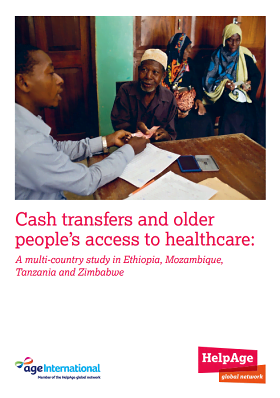
Cash Transfers and Older People’s Access to Healthcare: A Multi-Country Study in Ethiopia, Mozambique, Tanzania and Zimbabwe
Report
This report presents the findings of the Social Protection and Access to Health Services for Older People in Ethiopia, Mozambique, Tanzania and Zimbabwe study into the relationship between cash transfers and older people’s access to health services, carried out by Development Action on behalf of...

Cash alone is not enough: a smarter use of cash
Guidelines and Tools
Cash based interventions (CBIs) enable crisis affected people to make choices and prioritise their own needs. They also support markets critical to survival and recovery of communities. NRC is committed to increasing the use of cash across its programmes. Yet, cash based interventions are not a...
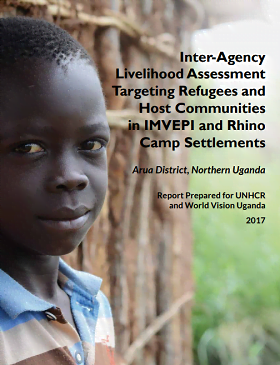
Inter-Agency Livelihood Assessment Targeting Refugees and Host Communities in IMVEPI and Rhino Camp Settlements Arua District, Northern Uganda
Case Study
This inter-agency needs assessment by World Vision Uganda (WVU), UNHCR and Caritas was conducted in two settlement areas of Rhino and Imvepi located in the West Nile Region of Uganda. The Imvepi settlement is the most recently opened area (February 2017) for resettlement and located about 72km east of the...
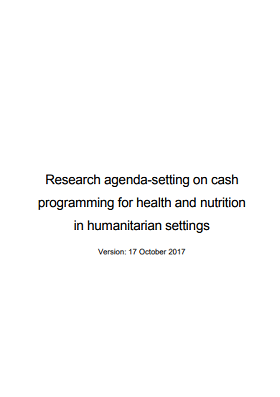
Research agenda-setting on cash programming for health and nutrition in humanitarian settings
Report
While the evidence base for cash transfer programming (CTP) in humanitarian contexts is more established for food security, it is very limited for health. The aim of this study was to develop a research agenda on CTP for health and nutrition in humanitarian settings.

Libya Humanitarian Cash Working Group (CWG) Key Messages
Report
The purpose of this document is to provide key messages of the Cash Working Group (CWG) that can be used in discussions with humanitarian stakeholders. This document is not designed to be passed to interlocutors, but rather inform CWG members on key points to raise in discussions.

Cash Transfers for Refugees – An Opportunity to Bridge the Gap Between Humanitarian Assistance and Social protection
Report
The world is now experiencing the biggest refugee crisis since the second world war. Many of the countries with the highest outflow of refugees are facing ongoing conflicts that are unlikely to end anytime soon. In fact, most displacement crises are protracted, with 80% lasting ten years or more. The...

Policy Briefing: Electronic Transfers in Humanitarian Assistance and Uptake of Financial Services
Report
The Electronic Cash Transfer Learning Action Network (ELAN) undertook case studies on humanitarian electronic transfer (‘e-transfer’) projects in Ethiopia, Zimbabwe and Bangladesh. The case studies examine the extent to which: recipients used digital financial services (e.g. money transfers, savings,...

Looking Back to Move Forward: Building on Learning from 2011 to Strengthen the 2017 Drought Response in Somalia Learning Report
Report
This report provides a summary of the discussions that took place during a half-day reflection workshop in May 2017. More than 40 people from national and international NGOs, the UN, donors and research organisations came together to consider lessons from the 2011 drought response, reflect on the use of...
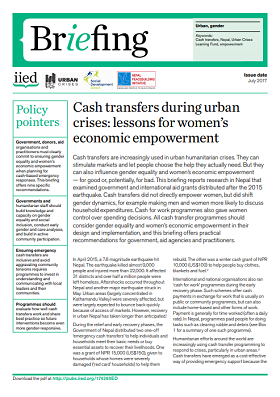
Cash Transfers During Urban Crises: Lessons for Women’s Economic Empowerment
Guidelines and Tools
Cash transfers are increasingly used in urban humanitarian crises. They can stimulate markets and let people choose the help they actually need. But they can also influence gender equality and women’s economic empowerment — for good or, potentially, for bad. This briefing reports research in Nepal...

Real time evaluation report for Kenya Red Cross Society
Report
After launching of its first Drought Emergency Appeal, Kenya Red Cross Society undertook a real time evaluation of its cash transfer response in May 2017 to find out what was working or not working in the KRCS emergency cash transfer response to enable decision making in the remaining period of the...
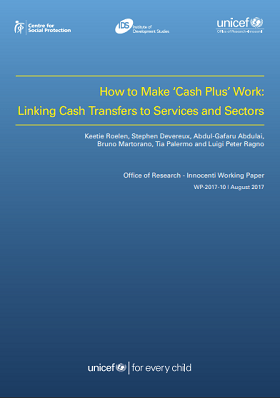
How to Make ‘Cash Plus’ Work: Linking Cash Transfers to Services and Sectors
Report
The broad-ranging benefits of cash transfers are now widely recognized. However, the evidence base highlights that they often fall short in achieving longer-term and second-order impacts related to nutrition, learning outcomes and morbidity.In recognition of these limitations, several ‘cash...

Cash transfer platforms in humanitarian contexts
Report
This report is based on ten days of desk-based research prepared for the Australian Government that aims to respond to the following questions: What is the rationale for using multi-purpose cash transfers and single platforms? What is driving donor agency positions on these issues? What is the evidence...
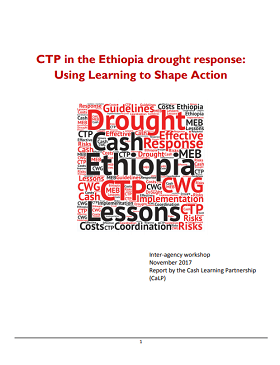
CTP in the Ethiopia Drought Response: Using Learning to Shape Action
Report
This workshop, convened by the CALP Network and the Ethiopia Cash Working Group, reflected on the use of cash transfers in the 2017 drought response. Key findings were: Cash helped address immediate needs and contributed to meeting some of the drought response objectives. There were significant...

Rapid Market Assessment Sofala Province, Mozambique
Report
The joint TDY between USAID/FFP and FEWS NET Mozambique to Sofala Province, Mozambique had two distinct objectives:
1) Assess current food security and market conditions including:
a) Scale of humanitarian assistance relative to needs
b) Understand maize market structure, conduct and performance
c)...
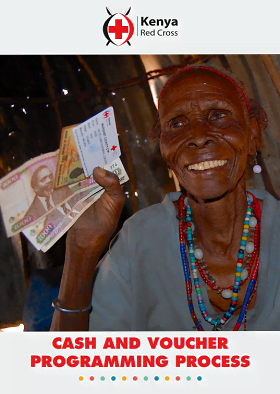
Kenya Red Cross Society’s – Cash and Voucher Programming Process
Guidelines and Tools
The document has been developed to highlight the general process that Kenya Red Cross Society uses when implementing Cash and Voucher programs/operations. Its a summarized version of Kenya Red Cross Society’s Standard Operating Procedure.

Kenya Red Cross Society Using New Technology to Reach Communities in Hardship Areas
Report
Kenya Red Cross Society responded to the severe drought through cash transfers in Marsabit county. Unlike an earlier drought, where KRCS used manual system to pay beneficiaries in the same geographical area, this year the organisation used a payment technology provided by a company called Compulynx....

Lessons from Northern Uganda in addressing gender based violence
Report
This case study summarises Action Against Hunger work in North Uganda. ACF aims to empower women in Northern Uganda using a two pronged strategy; a) cash transfers, skills training and VSLAs for income generating activities, and b) interventions to prevent violence against women at the household...

Learning Event Report: Multipurpose cash and protection for south sudanese refugees in Bidibi refugee settlement Uganda
Report
A consortium of partners comprising DanChurchAid (DCA), Transcultural Psychosocial Organization (TPO) and Mercy Corps (MC) have been implementing an 8-month Cash-based Interventions and Protection (MHPSS) response for South Sudanese refugees in Bidibidi settlement. The response was aimed at addressing...

Cash for Education: A global review of UNHCR programmes in refugee settings
Report
This review provides an overview of the use of cash assistance in 45 cash-related education programmes in 21 UNHCR operations. It highlights the key opportunities and challenges with the use of cash for education and provides key direction for future programming and related protection considerations....

Delivery Mechanism Mapping for Cash Based Interventions in Cox’s Bazaar Bangladesh
Report
The ‘Delivery Mechanism Mapping for Cash Based Interventions (CBI) in Cox’s Bazaar, Bangladesh’ was conducted in December 2017 by a ‘Cash Champion’ deployed from Catholic Relief Services (CRS) with the support of the Global Shelter Cluster and ECHO, and involved consultations with numerous...